#richard c white
Explore tagged Tumblr posts
Text

Hnnn
Getting back into it is so hard
Might delete later
#batman wears black eyeshadow he wears white to blend into the white eyes of his mask#which are mesh i decided#i kinda wanna make concept art of him...#ill remake it once i can get my hands on my tablet#not even my brushes worked as they used to#wtf is this#anyways#jason todd#richard grayson#dc fanart#dc universe#dcu#dc comics#the c stands for comics???#jason todd fanart
61 notes
·
View notes
Text

WHITE
5 notes
·
View notes
Text
CABIN IN THE WOODS (2011)

An excellent and rather thoughtful film to add to any horror fan's bag of tricks. It questions tropes you might not have even realized you’ve seen tens of times over and is a very satisfying movie. Perfect mix of horror and comedy, light and dark, yin and yang. This was our group pick for Halloween this year but this can be watched in any sort of situation or season (ya know, after the kiddos go to bed, this movie can get pretty gory).
⭐⭐⭐⭐.5
(Trigger Warning Suicide, Projectile Vomiting)

Our unsuspecting gang pile into their own little mystery van and head off to their murder cabin. On the way they meet a very unfriendly gas station attendant who clearly doesn’t like people or money. There is a moment of dramatic irony when a bird is destroyed by a force field just as the gang go through the mountain tunnel, letting us (the audience) know about the deadly force field that will come up later, but not letting our ill-fated friends know (until it is much too late). The little touches in the beginning are very good if you can see past the cute girl in underwear (and then the cute boy in his underwear).

The idea, given to us directly from the good folks down in the facility, is that the kids need to “transgress” and that will cause them to “deserve punishment.” But here is the thing. Them going in an open door of a cabin they have ownership of for the weekend isn’t punishable by… anything… They didn’t do anything wrong. Unless there was a big “DO NOT TOUCH” sign (hello, TAROT) even touching the stuff in the basement isn’t a transgression. But as our innocent little redhead will point out later in the movie, they pick the object of their demise. In this case they chose the diary of Patience Buckner (from The Zombie Redneck Torture Family) and that is who get unleashed upon them.

We quickly find out the people in the facility (namely Richard Jenkins and Bradley Whitford) are in control of a lot of the components of the evening (other than The Zombie Redneck Torture Family, they act on their own accord and are very violent). With help from guiding forces below the gang is split up and our first victim loses her head over the whole affair! They call her a whore but apparently before they started pumping chemicals into her she was a pretty normal gal, either way, the whore has to die first (for some reason).

Suddenly they are all getting picked off quickly, our stoner Shaggy is dragged off, Chris Hemsworth blew up (and I knew him when), our nerd (just a guy with glasses) gets something very sharp stuck in his throat, and all that is left is our “virgin” who isn’t even a virgin. Shaggy comes back from the dead though, he has been on that good good so he knows what is up and gets him and the redheaded “virgin” into the elevators for the amazing scene of seeing all the little critters the facility has captured to kill the kids. (Wack)

The next amazing scene is also an elevator scene, it is when Shaggy and the Redhead open all the cages and set everything free. A glorious gory scene of every nightmare creature coming for these ill-prepared little army men. A classic to be watched on repeat. A feast for the eyes and heart! Seriously, it is so good.

Finally when all the little workers have been ate up, Sigourney Weaver shows up as the director and is all, “Kill the stoner, kill the lush!” and our redhead almost does but a werewolf comes in to stop her (ha). Then Shaggy and Sigourney struggle while little Patience Buckner shuffles her little zombie feet on over to axe our ALIEN survivor in the head. She goes down and we are left again with our Shaggy and Red who hold hands as the world ends.

Maybe it was selfish for them to chose to let the world end, but let us be fair, if once a year multiple groups of people all over the world have to go through literal torture from demons just so the world keeps on turning, maybe the world is better off being over? I mean I think back to the footage from Tokyo being of a ghost in an elementary school classroom. It was funny because they turned the spirit into a frog and none of the kids got hurt, but the whole idea of the simulation was so that one or all the kids would die, and that is heavy.

#C#Cabin in the Woods#4.5 stars#Cabin in the woods review#cabin in the woods 2011#zombie movie#zombie movie review#horror comedy review#rewatch review#supernatural horror#fran kranz#kristen connolly#chris hemsworth#anna hutchison#jesse williams#bradley whitford#richard jenkins#sigourney weaver#amy acker#brian J. White#horror comedy#comedy review#horror review#horror#comedy#dark comedy#horror movie review#horror movie#movie review#horror films
4 notes
·
View notes
Text



#keith and charlie are wearing/sharing the exact same pair#mick has a slight variant#(you can tell b/c in the larger version of the pic Keith is wearing his own pair of patterned trousers. also mick’s have less white)#the rolling stones#charlie watts#keith richards#mick jagger#young married band#the married trio
15 notes
·
View notes
Text

Bad movie I have Se7en 1995
#Se7en#Morgan Freeman#Andrew Kevin Walker#Daniel Zacapa#Brad Pitt#Gwyneth Paltrow#John Cassini#Bob Mack#Peter Crombie#Reg E. Cathey#R. Lee Ermey#George Christy#Endre Hules#Hawthorne James#William Davidson#Bob Collins#Jimmy Dale Hartsell#Richard Roundtree#Charline Su#Dominique Jennings#Allan Kolman#Beverly Burke#Gene Borkan#Julie Araskog#Mario Di Donato#Alfonso Freeman#John C. McGinley#Harrison White#Bob Stephenson#Michael Reid MacKay
2 notes
·
View notes
Photo

The Island of Lost Souls (Erle C. Kenton, 1932), cinematography by Karl Struss
#The Island of Dr. Moreau#The Island of Lost Souls#Erle C. Kenton#1930s cinema#black-and-white movies#reflection#ripples#Karl Struss#Richard Arlen#Kathleen Burke
0 notes
Text
As president of the United States, Donald Trump threatened the federally issued licenses of television broadcast outlets that displeased him. In 2017, after NBC News reported a dispute between the president and his military advisors about the size of the nuclear arsenal, the president launched a series of tweets:
These 2017 tweets did not specifically suggest that he would have the Federal Communications Commission (FCC), which issues the airwave licenses, revoke them on his order. Instead, they appear to echo the 1972 tactics of Richard Nixon, who, displeased by coverage from the Washington Post, encouraged a third party to file a challenge at the FCC (which ultimately went nowhere).
In response to the 2017 tweets, the Trump-appointed chairman of the FCC, Ajit Pai, took a firm stand. “I believe in the First Amendment,” he said. “Under the law, the FCC does not have the authority to revoke a license of a broadcast station based on a particular newscast.”
Now, in 2024, as a presidential candidate, Donald Trump has reasserted that broadcasters who displease him should lose their federal airwave licenses. A September 2023 post on Truth Social accused NBC of “Country Threatening Treason.” He added, “Why should NBC, or any of the other corrupt & dishonest media companies, be entitled to use the very valuable Airwaves of the USA, FREE?”
The current Chair of the FCC, Jessica Rosenworcel, responded, “the First Amendment is a cornerstone of our democracy. The FCC does not and will not revoke licenses for broadcast stations simply because a political candidate disagrees with or dislikes content or coverage.”
However, the ability of future FCCs to stand up to such instructions could be at risk. Candidate Trump has promised, “I will bring the independent regulatory agencies, such as the FCC and the FTC, back under Presidential authority, as the Constitution demands.” While the Constitution never mentions regulatory agencies, bringing the FCC under direct presidential control would surely undercut its independent decision-making.
But a president of the United States already has powers beyond coercing the FCC. These powers could be exercised not only against broadcasters, but also against those who operate the internet.
The “Doomsday Book”
During his presidency, Donald Trump asserted, “When somebody’s president of the United States, the authority is total.” Whether or not presidential authority is “total,” there does already exist a compendium of presidential powers that have been enacted by Congress for use in extreme circumstances.
Reportedly locked in a White House safe are the secret “Presidential Emergency Action Documents” (PEADs). Colloquially known as the “Doomsday Book,” they are a collection of powers authorized by Congress for the president to use in emergencies. Included in this compendium is Section 706 (codified as 47 USC 606), titled, “War Emergency – Powers of the President,” that is tucked away at the end of the Communications Act of 1934, the statute that created the FCC.
TIME Magazine reports, “When Donald Trump was in the Oval Office, members of the national security staff actively worked to keep him from learning the full extent of these interpretations of presidential authority, concerned he would abuse them.”
Here is what Section 706 authorizes:
(c) Upon proclamation by the President that there exists war or a threat of war, or a state of public peril or disaster or other national emergency… the President, if he deems it necessary in the interest of national security or defense, may suspend or amend, for such time as he may see fit, the rules and regulations applicable to any or all stations or devices capable of emitting electromagnetic radiations within the jurisdiction of the United States as prescribed by the Commission, and may cause the closing of any station for radio communication…
The next subsection, using similar “national security” criteria, gives the president authority over the wired networks, such as those that carry telephone and internet service. Section 706(d), in pertinent part, authorizes the president to “suspend or amend the rules and regulations applicable to any or all facilities or stations for wire communication… cause the closing of any facility or station for wire communication… [or] authorize the use or control of any such facility or station… by any department of the Government under such regulations as he may prescribe…”
The terms “war or a threat of war, or a state of public peril or disaster or other national emergency” are not defined by the Communications Act. Such declarations of national emergency were, however, a go-to solution when Donald Trump was in office. The effort to restrict travel from majority-Muslim countries was justified on national security grounds. Tariffs were levied on foreign steel and aluminum as a national security threat based on their impact on domestic production. When Congress would not give him the funding he wanted for the Mexican border wall, the president simply used a national emergency declaration to reallocate Defense Department funds to build the wall. Reportedly, he even considered declaring that the use of natural gas for electricity production was a national security risk because the gas pipelines could become terrorist targets.
The power of the Chief
Candidate Trump, in September 2023, posted that NBC and other “corrupt & dishonest media companies” are “a true threat to democracy and are, in fact, THE ENEMY OF THE PEOPLE!” He declared, “The Fake News Media should pay a big price for what they have done to our once great Country.”
A 2021 report by the nonpartisan Congressional Research Service (CRS) concluded, “in the American governmental experience, the exercise of emergency powers has been somewhat dependent on the Chief Executive’s view of the presidential office.” When he was Chief Executive, Donald Trump explained how he viewed the office: “I have Article II [of the Constitution], where I have the right to do whatever I want as president.”
The tools to do whatever the president wants—whether at the FCC or in the Doomsday Book—are at hand. As the CRS report concluded, such decisions are dependent “on the Chief Executive’s view of the presidential office.”
The institution that created these broad powers, the Congress, has an important role as overseer of the authority they have delegated to the executive. Congress constantly holds oversight hearings on the agencies of the executive branch; hearings on the unilateral powers granted to the president are warranted. The threshold question for such hearings should be whether there are sufficient guardrails in place to protect against their abuse, and what such protections should look like. Regardless of who wins the election—Congress should review whether the unilateral powers granted to the president in the 20th century need updating for the 21st century.
140 notes
·
View notes
Text
more queer houses!
Klovharu Summer Cottage by Raili Pietilä for Tove Jansson and Tuulikki Pietilä
1964-1965, Klovharu Island, Porvoo Archipelago, Finland
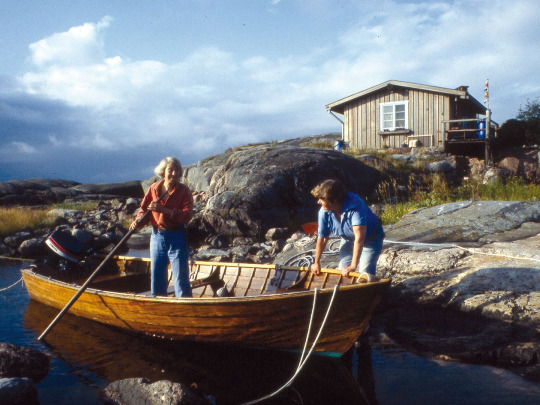
Tove Jansson and Tuulikki Pietilä spent every summer in this cottage for nearly 30 years. Tove chose the site by camping on various places on Klovharu, and they designed it with Tuulikki's sister-in-law, based on a fisherman's cabin on the island of Pellinge. It lacked electricity and running water, and if guests arrived, Tove and Tuulikki would give up the bed and camp outside. the cottage is a single room, with a cellar underneath--for food storage and a small sauna--built into the rock. the cottage is now an artist residency--with the original interiors preserved--but can be visited during one week in July. More about the cottage. Interview with Raili Pietilä. Tuulikki's films.
Hangover House by William Alexander Levy for Richard Haliburton
1937, Laguna Beach, California, USA

Hangover House, or Halliburton House, was designed by William Alexander Levy (he later dropped Levy from his name) for celebrity explorer Richard Halliburton and his ghostwriter and lover Paul Mooney. Supposedly, by the time the house was completed Halliburton and Mooney's relationship had expanded to include a third: Alexander himself. The house was built of concrete, with large public rooms and three small bedrooms, one for each of the men. Sadly, Halliburton and Mooney were lost at sea in 1939, and Halliburton's family sold the house and buried all references to his queerness. The house still stands today and is a private residence. More images here.
Azurest South by Amaza Lee Meredith 1938, Ettrick, Virginia, USA

Azurest South might be the first International Style home to have been built in Virginia, and instead of in a wealthy white enclave like you might expect, it's located just off of the campus of Virginia State University, an Historic Black College/University. it was built by pioneering artist, architect, and educator Amaza Lee Meredith for herself and her partner, Dr. Edna Meade Colson. colson was the head of the education department at VSU, and meredith was head of the art department (which she had created in 1930). we know from her scrapbooks that meredith was looking at european designs and experimenting with them in the house. the result was something unlike everything around it--flat roofs, glass bricks, bright paint and tilework inside--an antidote to traditionally conservative virginia architecture. azurest south today belongs to the vsu alumni association. it is not open to visit, but has received increased attention and grant funding over the past few years, so it may well be someday! More about Meredith as architect. More about Azurest South. And more! (additionally, if you're near richmond va there's an exhibition about meredith & azurest south at the institute for contemporary art until march 9 2025)
Six Acres by Mary Imrie and Jean Wallbridge 1954-1957, Edmonton, Alberta, Canada

Mary Imrie and Jean Wallbridge were partners in work and life, establishing the first all-female architectural firm in Canada. in the 50s, they built a house to serve as their home and office along the banks of the north saskatchewan river and called it "six acres" after the size of the lot. they traveled enthusiastically and widely (pdf) and were avid outdoorspeople. like a lot of women architects at this point in the 20th century, they were largely relegated to residential commissions, which they found frustrating. that said, they gained a reputation for helping clients who were struggling with construction costs by encouraging gatherings of friends and neighbors to assist with the work, something they had hands-on experience with, having assisted in the building of their own home. the house is still standing and is now the office of the alberta land stewardship centre. timeline of their lives and careers. more about the house itself.
Finella by Raymond McGrath for Mansfield Duval Forbes c. 1850, renovated 1929, Cambridge, England, UK

Mansfield Forbes was an english don at clare college, cambridge. in 1928 he leased a victorian home called "the yews" and spent the next year working with Raymond McGrath (previous seen here) to transform it into a modern fairyland, named in tribute of Finella, a 10th century Pictish queen. the interiors were a celebration of new materials--there were floors made of induroleum (wood and asbestos powder), walls painted with iridescent cellulose paint, something called copper plymax (??), and the entry hall had a vaulted ceiling covered in glass panels backed with silver leaf. forbes intended it to be a gathering place of sympathetic minds, to host salons in celebration of modern art and architecture in a setting a queer and future-looking as he himself was. unfortunately, he vastly overspent in outfitting Finella, and when he died suddenly in 1935, the contents of the house were auctioned off. Finella is still part of Cambridge and houses fellows of gonville & caius college. the college recently restored the hall, which can apparently be toured on specific days. interior photos from 1929 and 2004.
112 Charles Street by Eleanor Raymond 1868, renovated 1922, Boston, Massachusetts, USA

When Eleanor Raymond began work on 112 Charles Street, it had recently had the front 10 feet sliced off to allow for the widening of the street, so her renovation was essentially a reimagining. eleanor designed the house for her mother, who had her own apartment, as well as eleanor herself, her sister rachel, and her partner ethel powers. the three of them shared a floor. powers wrote for the magazine House Beautiful (and would go on to be its editor) and featured the home three times. in the largest feature on its interiors, she emphasized that since it was a home of three business women, it needed to be "self running." raymond would go on to design and build much more modernist houses, and the conservative appearance of this one might be due to how early in her career it was (she graduated from her architecture program in 1919), but i think it's more likely that she was aware of the necessity of appearing somewhat inconspicuous in her surroundings, as a queer woman with a career. read more about her work here. and here.
#queer architecture#long post#most of my sources are the things i linked to with the exception of finella#finella i learned about from an article in the journal of british studies#she also authored the chapter about it in the book 'Queer Spaces'#happy to send the article along to any interested parties#hangover house i read about in a different article which i can also hunt up if requested
123 notes
·
View notes
Text
Chicago, Illinois is often considered to be on the periphery of the plantation. William Cronon's famous narrative of Chicago's relationships with the "Great West" positions the burgeoning city at the edge of American expansion into plantation agriculture in the Midwest and industrial farming on a national scale. [...] [W]e could also characterize the city as an anticipatory hub between the twin plantation figures of the pre-war American South and America's 20th century colonies [in Central America, the Philippines, and beyond]. During the Reconstruction years, Chicago emerged as a logistical center, channeling America's railroads and telegraph lines into itself. As parts of this communications node, Chicago newspapers and military police served to convert white anxieties about Black migration from the plantation South into new techniques and technologies of prediction that became transportable across a newly imaginable informational plane of US imperialism. [...] [I]n Chicago between 1875 and 1890, [...] white anticipations of African American migration from plantations in the South were translated into new information sciences and policing techniques that made their way to plantations in places like the Philippines. [...]
[S]uch feelings were fundamental to linking plantations which at first seem so spatially and temporally distant. [...]
---
On May 3, 1879 the Chicago Tribune published a greatly anticipated investigatory series entitled, “The Negro Exodus: Causes of the Migration from the Negro’s Point of View” [...] the latest in a long sequence of deeply uneasy reports dating from 1860. From its location at the communicative center of all major US rail and telegraph lines, the Chicago Tribune undertook an imagined responsibility to inform its Midwestern audience of Black peoples’ movements and behaviors. [...] At the climax of the “Negro’s Point of View” series, [...] May 3, the Chicago Tribune presented its showstopping report from its correspondent in Vicksburg, Mississippi entitled “Letters Written by Negroes in Kansas to their Friends South”. In this report, the writer discusses his skepticism of earlier methods of [...] interviews with Black migrants. [...] [The newspaper] conducted its fact-gathering through the mass surveillance of Black peoples' letters [...] [to assess] inner motivations [...] about Black peoples’ “perceptions, enjoyments, and reasons” [...]. Such informational appetites became the anticipatory basis for 20th century enumerative practices. As Colin Koopman argues, informational fastening, or the atomization and separation of facts from Black peoples’ bodies, became commonplace during the Great Migration in the practice of racial statistics, criminology, and health policy directed at Black migrants [...].
---
White Chicagoans’ prolonged concern over predicting Black behaviors and intentions materialized in 1877, when the city became a central hub of militarized response to a nation-wide railroad strike. Adjutant General Richard C. Drum, who commanded the Military Division of the Missouri (Western Frontier) in Chicago from 1873 to 1878, took control of Chicago’s military response to the Great Railroad Strike of 1877. In 1879, after his final year in the city, Drum moved to Washington, DC and proposed the establishment of the Military Information Division (MID) [...]. The MID, which formally established in 1885, maintained close ties to Chicago's local information collection system, adopting a Bertillon identification system of collecting and storing intelligence cards at the time that the National Association of Chiefs of Police established their central bureau of identification in Chicago in 1896 [...]. By the tun of the 20th century, Chicago's police force had expanded tenfold [...], and Drum's MID had amassed over 300,000 intelligence cards [...].
---
The affective atmosphere into which the MID intensified its own predictive techniques later traversed the Pacific Ocean into the Philippines. Alfred McCoy argues that the American introduction of communication technologies and surveillance techniques in governing the Philippines constituted the United States’ first information revolution (McCoy 2009: 18). Colonial police trained in the anxious habits of the MID, rendered the Philippines a laboratory for securitized speculation. McCoy further contends that these informational “capillaries of empire” embedded themselves into the Philippines’ plantocratic-security state as well as US domestic surveillance practices. I add to McCoy’s argument by suggesting that trained feelings of white apprehension translated into imperial mechanisms for governing the Philippines through systems of intelligence cards, telecommunications infrastructure, policing units, and management sciences. Reminiscent of the psychological investigatory projects that saturated Chicago’s public life, the MID and its successors developed techniques for psychological examination and personality typing led by another Chicagoan, Harry Hill Bandholtz. [...] Bandholtz sharpened the MID's informational sciences by training Philippines police forces in the neurotic art of collecting every imaginable fact about Filipino behaviors [...].
---
Ultimately, the US colonial plantocracy in the Philippines built its authority around information infrastructures which had been trained on apprehensive practices and feelings emanating from Chicago’s racialized geography. [...] [T]he informational networks that extended from the image of the American South, through the anticipation of Chicago's public, [...] animated the governance of colonial plantations in the Philippines [...].
---
All text above by: Jolen Martinez. "Plantation Anticipation: Apprehension in Chicago from Reconstruction America to the Plantocratic Philippines" (2024). An essay from an Intervention Symposium titled Plantation Methodologies: Questioning Scale, Space, and Subjecthood. The symposium was introduced and edited by Alyssa Paredes, Sophie Chao, and Andrés León Araya. The symposium was hosted and published by Antipode Online, part of Antipode: A Radical Journal of Geography. Published online 4 January 2024, at: antipodeonline.org/2024/01/04/plantation-methodologies/ [In this post, bold emphasis and some paragraph breaks/contractions added by me. Presented here for commentary, teaching, criticism purposes.]
#tidalectics#multispecies#abolition#incredible cant take this any more#like a big inescapable spiderweb#ecology#ongoing chicago discussion#ecologies
202 notes
·
View notes
Text
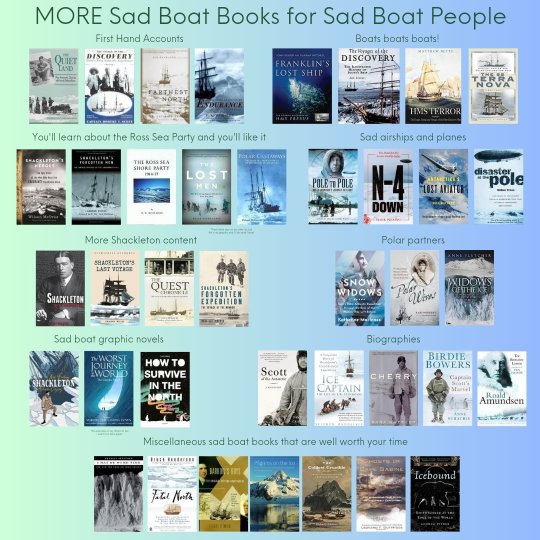
BECAUSE YOU DEMANDED IT, I'm back with more Sad Boat Books for Sad Boat People! But first, some words.
I never dreamed that a silly little graphic I made for some friends would generate this much response on twitter and here, but I'm overjoyed that it resonated with so many of you! I read every single comment and tag, and by far my favorites are all of the people who say some variation of "I thought I was the only one who loved these books." We are NOT alone, there are literally thousands of people who reblogged or retweeted this list-- people of all ages and backgrounds and gender identities. Sad Boat isn't just for old white men! I was also delighted to hear from other librarians who are using this in displays and for reader's advisory. PLEASE go forth and do so with my blessing, nothing would make me happier! I was recently laid off from my librarian job as part of a restructuring under new management (don't worry about me, it sucks right now but I'm gonna be fine), so I would love to think that I'm still contributing to the library ecosystem while I'm out of commission. I would also love to keep making these lists (including one that deals with Sad Boat fiction and one with recommendations for other types of media), and I've never had more time to do it, so if you have suggestions, please drop them in my inbox!
Anyway, enough of that-- here are more books! I've either read all of these, or the recommendation came from someone I trust, so read with confidence!
First Hand Accounts
The Quiet Land: The Antarctic Diaries of Frank Debenham edited by June Debenham Back
The Voyage of the Discovery by Robert Falcon Scott
Farthest North by Fridtjof Nansen
Endurance by F.A. Worsley
Boats boats boats!
Franklin's Lost Ship: The Historic Discovery of HMS Erebus by Alanna Mitchell and John Geiger
The Voyages of the Discovery: The Illustrated History of Scott's Ship by Ann Savours
HMS Terror: The Design, Fitting, and Voyages of a Polar Discovery Ship by Matthew Betts
The SS Terra Nova (1884-1943): Whaler, Sealer, and Polar Exploration Ship by Michael C. Tarver
You'll learn about the Ross Sea Party and you'll like it
Shackleton's Heroes by Wilson McOrist
Shackleton’s Forgotten Men: The Untold Tragedy of the Endurance Epic by Lennard Bickel
The Ross Sea Shore Party 1914-1917 by R.W. Richards
The Lost Men by Kelly Tyler-Lewis*
Polar Castaways by Richard McElrea and David Harrowfield*
*These were on my other list, but this is my graphic and I'll do what I want
Sad Airships and Planes
From Pole to Pole: Roald Amundsen's Journey in Flight by Garth James Cameron
N-4 Down: The Hunt for the Arctic Airship Italia by Mark Piesing
Antarctica's Lost Aviator by Jeff Maynard
Disaster at the Pole: The Tragedy of the Airship Italia and the 1928 Nobile Expedition to the North Pole by Wilbur Cross
More Shackleton Content
Shackleton: A Life in Poetry by Jim Mayer
Shackleton's Last Voyage by Frank Wild
The Quest Chronicle: The Story of the Shackleton-Rowett Expedition by Jan Chojecki
Shackleton's Forgotten Expedition: The Voyage of the Nimrod by Beau Riffenburgh
Polar Partners
Snow Widows by Katherine MacInnes
Polar Wives: The Remarkable Women Behind the World's Most Daring Explorers by Kari Herbert
Widows of the Ice by Anne Fletcher
Sad Boat Graphic Novels
Shackleton: Antarctic Odyssey by Nick Bertozzi
The Worst Journey in the World- The Graphic Novel Volume 1: Making Our Easting Down adapted by Sarah Airriess from the book by Apsley Cherry-Garrard*
How To Survive in the North by Luke Healy
*This was also on my other list, but this is my graphic and I'll do what I want
Biographies
Scott of the Antarctic by David Crane
Ice Captain: The Life of J.R. Stenhouse by Stephen Haddelsey
Cherry: A Life of Apsley Cherry-Garrard by Sara Wheeler
Birdie Bowers: Captain Scott's Marvel by Anne Strathie
Roald Amundsen by Tor Bomann-Larsen
Miscellaneous sad boat books that are well worth your time
I May Be Some Time: Ice and the English Imagination by Francis Spufford
Fatal North: Adventure and Survival Aboard USS Polaris, The First US Expedition to the North Pole by Bruce Henderson
Barrow's Boys: A Stirring Story of Daring, Fortitude, and Outright Lunacy by Fergus Fleming
Pilgrims on the Ice by T.H. Baughman
The Coldest Crucible: Arctic Exploration and American Culture by Michael F. Robinson
Ghosts of Cape Sabine by Leonard F. Guttridge
Icebound: Shipwrecked at the Edge of the World by Andrea Pitzer
If you read and enjoy any of these, please let me know!
EDITED TO ADD: OG Sad Boat Books post here!
#reader's advisory#sad boat#sad boat books#polar exploration#nautical history#read this#sad boat 2: electric boogaloo
661 notes
·
View notes
Text






JSTOR Articles on the History of Witchcraft, Witch Trials, and Folk Magic Beliefs
This is a partial of of articles on these subjects that can be found in the JSTOR archives. This is not exhaustive - this is just the portion I've saved for my own studies (I've read and referenced about a third of them so far) and I encourage readers and researchers to do their own digging. I recommend the articles by Ronald Hutton, Owen Davies, Mary Beth Norton, Malcolm Gaskill, Michael D. Bailey, and Willem de Blecourt as a place to start.
If you don't have personal access to JSTOR, you may be able to access the archive through your local library, university, museum, or historical society.
Full text list of titles below the cut:
'Hatcht up in Villanie and Witchcraft': Historical, Fiction, and Fantastical Recuperations of the Witch Child, by Chloe Buckley
'I Would Have Eaten You Too': Werewolf Legends in the Flemish, Dutch and German Area, by Willem de Blecourt
'The Divels Special Instruments': Women and Witchcraft before the Great Witch-hunt, by Karen Jones and Michael Zell
'The Root is Hidden and the Material Uncertain': The Challenges of Prosecuting Witchcraft in Early Modern Venice, by Jonathan Seitz
'Your Wife Will Be Your Biggest Accuser': Reinforcing Codes of Manhood at New England Witch Trials, by Richard Godbeer
A Family Matter: The CAse of a Witch Family in an 18th-Century Volhynian Town, by Kateryna Dysa
A Note on the Survival of Popular Christian Magic, by Peter Rushton
A Note on the Witch-Familiar in Seventeenth Century England, by F.H. Amphlett Micklewright
African Ideas of Witchcraft, by E.G. Parrinder
Aprodisiacs, Charms, and Philtres, by Eleanor Long
Charmers and Charming in England and Wales from the Eighteenth to the Twentieth Century, by Owen Davies
Charming Witches: The 'Old Religion' and the Pendle Trial, by Diane Purkiss
Demonology and Medicine in the Sixteenth and Seventeenth Centuries, by Sona Rosa Burstein
Denver Tries A Witch, by Margaret M. Oyler
Devil's Stones and Midnight Rites: Megaliths, Folklore, and Contemporary Pagan Witchcraft, by Ethan Doyle White
Edmund Jones and the Pwcca'r Trwyn, by Adam N. Coward
Essex County Witchcraft, by Mary Beth Norton
From Sorcery to Witchcraft: Clerical Conceptions of Magic in the Later Middle Ages, by Michael D. Bailey
German Witchcraft, by C. Grant Loomis
Getting of Elves: Healing, Witchcraft and Fairies in the Scottish Witchcraft Trials, by Alaric Hall
Ghost and Witch in the Sixteenth and Seventeenth Centuries, by Gillian Bennett
Ghosts in Mirrors: Reflections of the Self, by Elizabeth Tucker
Healing Charms in Use in England and Wales 1700-1950, by Owen Davies
How Pagan Were Medieval English Peasants?, by Ronald Hutton
Invisible Men: The Historian and the Male Witch, by Lara Apps and Andrew Gow
Johannes Junius: Bamberg's Famous Male Witch, by Lara Apps and Andrew Gow
Knots and Knot Lore, by Cyrus L. Day
Learned Credulity in Gianfrancesco Pico's Strix, by Walter Stephens
Literally Unthinkable: Demonological Descriptions of Male Witches, by Lara Apps and Andrew Gow
Magical Beliefs and Practices in Old Bulgaria, by Louis Petroff
Maleficent Witchcraft in Britian since 1900, by Thomas Waters
Masculinity and Male Witches in Old and New England, 1593-1680, by E.J. Kent
Methodism, the Clergy, and the Popular Belief in Witchcraft and Magic, by Owen Davies
Modern Pagan Festivals: A Study in the Nature of Tradition, by Ronald Hutton
Monstrous Theories: Werewolves and the Abuse of History, by Willem de Blecourt
Neapolitan Witchcraft, by J.B. Andrews and James G. Frazer
New England's Other Witch-Hunt: The Hartford Witch-Hunt of the 1660s and Changing Patterns in Witchcraft Prosecution, by Walter Woodward
Newspapers and the Popular Belief in Witchcraft and Magic in the Modern Period, by Owen Davies
Occult Influence, Free Will, and Medical Authority in the Old Bailey, circa 1860-1910, by Karl Bell
Paganism and Polemic: The Debate over the Origins of Modern Pagan Witchcraft, by Ronald Hutton
Plants, Livestock Losses and Witchcraft Accusations in Tudor and Stuart England, by Sally Hickey
Polychronican: Witchcraft History and Children, interpreting England's Biggest Witch Trial, 1612, by Robert Poole
Publishing for the Masses: Early Modern English Witchcraft Pamphlets, by Carla Suhr
Rethinking with Demons: The Campaign against Superstition in Late Medieval and Early Modern Europe from a Cognitive Perspective, by Andrew Keitt
Seasonal Festivity in Late Medieval England, Some Further Reflections, by Ronald Hutton
Secondary Targets: Male Witches on Trial, by Lara Apps and Andrew Gow
Some Notes on Modern Somerset Witch-Lore, by R.L. Tongue
Some Notes on the History and Practice of Witchcraft in the Eastern Counties, by L.F. Newman
Some Seventeenth-Century Books of Magic, by K.M. Briggs
Stones and Spirits, by Jane P. Davidson and Christopher John Duffin
Superstitions, Magic, and Witchcraft, by Jeffrey R. Watt
The 1850s Prosecution of Gerasim Fedotov for Witchcraft, by Christine D. Worobec
The Catholic Salem: How the Devil Destroyed a Saint's Parish (Mattaincourt, 1627-31), by William Monter
The Celtic Tarot and the Secret Tradition: A Study in Modern Legend Making, by Juliette Wood
The Cult of Seely Wights in Scotland, by Julian Goodare
The Decline of Magic: Challenge and Response in Early Enlightenment England, by Michael Hunter
The Devil-Worshippers at the Prom: Rumor-Panic as Therapeutic Magic, by Bill Ellis
The Devil's Pact: Diabolic Writing and Oral Tradition, by Kimberly Ball
The Discovery of Witches: Matthew Hopkins' Defense of his Witch-hunting Methods, by Sheilagh Ilona O'Brien
The Disenchantment of Magic: Spells, Charms, and Superstition in Early European Witchcraft Literature, by Michael D. Bailey
The Epistemology of Sexual Trauma in Witches' Sabbaths, Satanic Ritual Abuse, and Alien Abduction Narratives, by Joseph Laycock
The European Witchcraft Debate and the Dutch Variant, by Marijke Gijswijt-Hofstra
The Flying Phallus and the Laughing Inquisitor: Penis Theft in the Malleus Maleficarum, by Moira Smith
The Framework for Scottish Witch-Hunting for the 1590s, by Julian Goodare
The Imposture of Witchcraft, by Rossell Hope Robbins
The Last Witch of England, by J.B. Kingsbury
The Late Lancashire Witches: The Girls Next Door, by Meg Pearson
The Malefic Unconscious: Gender, Genre, and History in Early Antebellum Witchcraft Narratives, by Lisa M. Vetere
The Mingling of Fairy and Witch Beliefs in Sixteenth and Seventeenth Century Scotland, by J.A. MacCulloch
The Nightmare Experience, Sleep Paralysis, and Witchcraft Accusations, by Owen Davies
The Pursuit of Reality: Recent Research into the History of Witchcraft, by Malcolm Gaskill
The Reception of Reginald Scot's Discovery of Witchcraft: Witchcraft, Magic, and Radical Religions, by S.F. Davies
The Role of Gender in Accusations of Witchcraft: The Case of Eastern Slovenia, by Mirjam Mencej
The Scottish Witchcraft Act, by Julian Goodare
The Werewolves of Livonia: Lycanthropy and Shape-Changing in Scholarly Texts, 1550-1720, by Stefan Donecker
The Wild Hunter and the Witches' Sabbath, by Ronald Hutton
The Winter Goddess: Percht, Holda, and Related Figures, by Lotta Motz
The Witch's Familiar and the Fairy in Early Modern England and Scotland, by Emma Wilby
The Witches of Canewdon, by Eric Maple
The Witches of Dengie, by Eric Maple
The Witches' Flying and the Spanish Inquisitors, or How to Explain Away the Impossible, by Gustav Henningsen
To Accommodate the Earthly Kingdom to Divine Will: Official and Nonconformist Definitions of Witchcraft in England, by Agustin Mendez
Unwitching: The Social and Magical Practice in Traditional European Communities, by Mirjam Mencej
Urbanization and the Decline of Witchcraft: An Examination of London, by Owen Davies
Weather, Prayer, and Magical Jugs, by Ralph Merrifield
Witchcraft and Evidence in Early Modern England, by Malcolm Gaskill
Witchcraft and Magic in the Elizabethan Drama by H.W. Herrington
Witchcraft and Magic in the Rochford Hundred, by Eric Maple
Witchcraft and Old Women in Early Modern Germany, by Alison Rowlands
Witchcraft and Sexual Knowledge in Early Modern England, by Julia M. Garrett
Witchcraft and Silence in Guillaume Cazaux's 'The Mass of Saint Secaire', by William G. Pooley
Witchcraft and the Early Modern Imagination, by Robin Briggs
Witchcraft and the Western Imagination by Lyndal Roper
Witchcraft Belief and Trals in Early Modern Ireland, by Andrew Sneddon
Witchcraft Deaths, by Mimi Clar
Witchcraft Fears and Psychosocial Factors in Disease, by Edward Bever
Witchcraft for Sale, by T.M. Pearce
Witchcraft in Denmark, by Gustav Henningsen
Witchcraft in Germany, by Taras Lukach
Witchcraft in Kilkenny, by T. Crofton Croker
Witchcraft in Anglo-American Colonies, by Mary Beth Norton
Witchcraft in the Central Balkans I: Characteristics of Witches, by T.P. Vukanovic
Witchcraft in the Central Balkans II: Protection Against Witches, by T.P. Vukanovic
Witchcraft Justice and Human Rights in Africa, Cases from Malawi, by Adam Ashforth
Witchcraft Magic and Spirits on the Border of Pennsylvania and West Virginia, by S.P. Bayard
Witchcraft Persecutions in the Post-Craze Era: The Case of Ann Izzard of Great Paxton, 1808, by Stephen A. Mitchell
Witchcraft Prosecutions and the Decline of Magic, by Edward Bever
Witchcraft, by Ray B. Browne
Witchcraft, Poison, Law, and Atlantic Slavery, by Diana Paton
Witchcraft, Politics, and Memory in Seventeeth-Century England, by Malcolm Gaskill
Witchcraft, Spirit Possession and Heresy, by Lucy Mair
Witchcraft, Women's Honour and Customary Law in Early Modern Wales, by Sally Parkin
Witches and Witchbusters, by Jacqueline Simpson
Witches, Cunning Folk, and Competition in Denmark, by Timothy R. Tangherlini
Witches' Herbs on Trial, by Michael Ostling
#witchcraft#witchblr#history#history of witchcraft#occult#witch trials#research#recommended reading#book recs#jstor
2K notes
·
View notes
Text
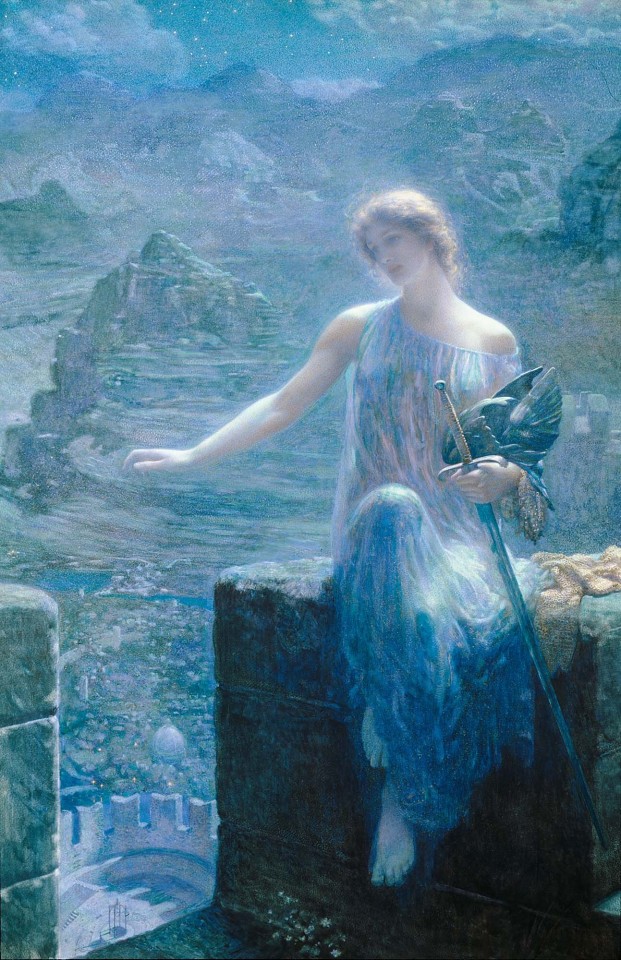


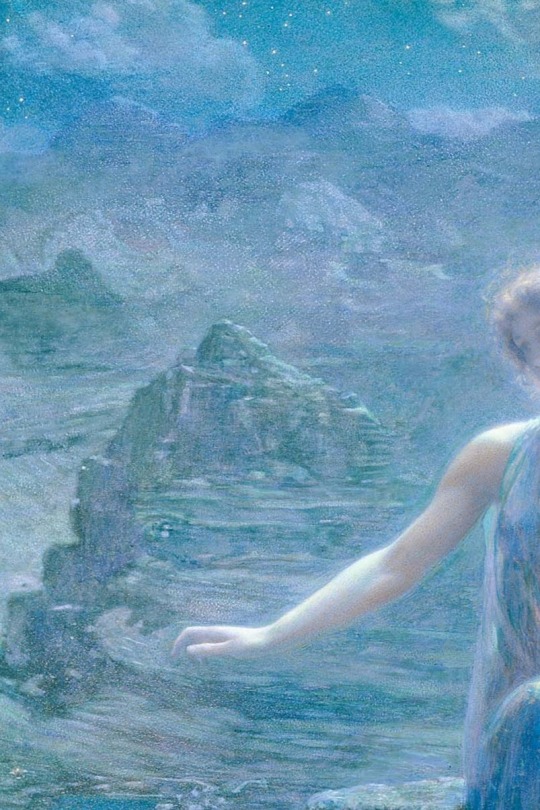
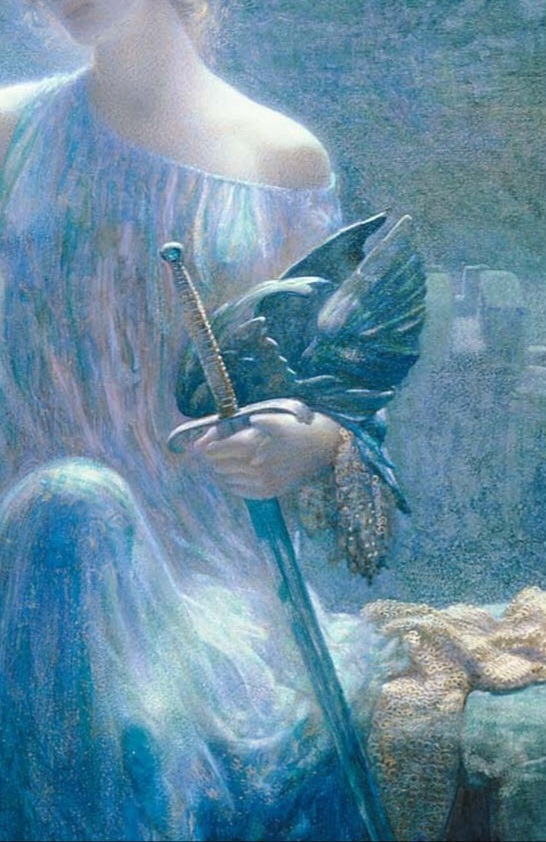
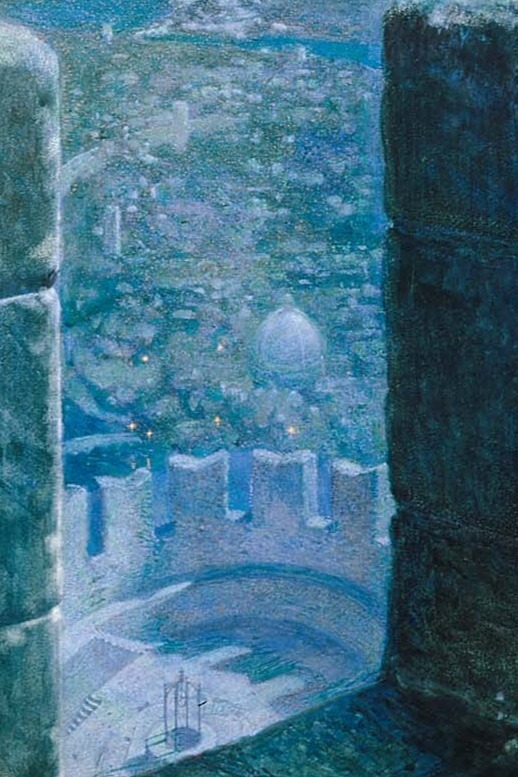
EDWARD ROBERT HUGHES ‐ THE VALKYRIE’S ’s VIGIL, c. 1906
The depicted woman is a Valkyrie, one of Odin’s warrior goddesses in Old Norse mythology. She is responsible for guiding the bravest warriors who perish in battle to Valhalla, the afterlife hall of Odin where the most courageous warriors reside forever.
The Valkyrie is shown perched on top of the castle battlement. She waits with her helmet and sword, ready to bring the latest warriors to Valhalla. A soft, bright white light flows down onto her from the top. Hughes portrays a serene and peaceful moment amidst the assumed violent battle she is overseeing.
The story regained popularity after Richard Wagner's famous 1870 opera, Die Walküre (The Valkyrie), which includes the well-known song, "Ride of the Valkyries". During this time, it was typical for old myths to be reimagined in romantic ways. Hughes created another artwork in 1902, which portrayed a Valkyrie, titled "Dream Idyll (A Valkyrie)."
This potrayal is very different from that of a Valkyrie, who could be imagined to be a ruthless character associated with death and battle. The absence of a wolf or raven, symbols of war, goes on to underline this softer interpretation further, letting viewers delve deep into the depths of her character beyond a warrior.
99 notes
·
View notes
Text
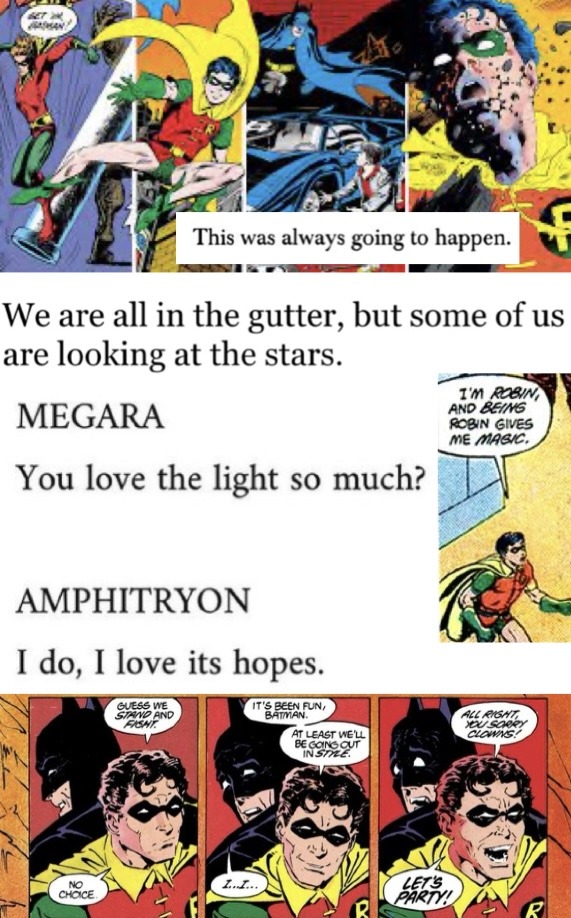
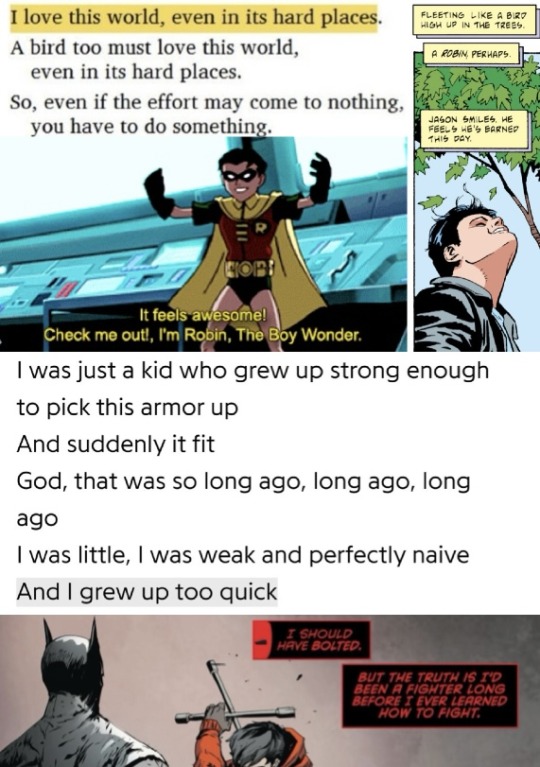




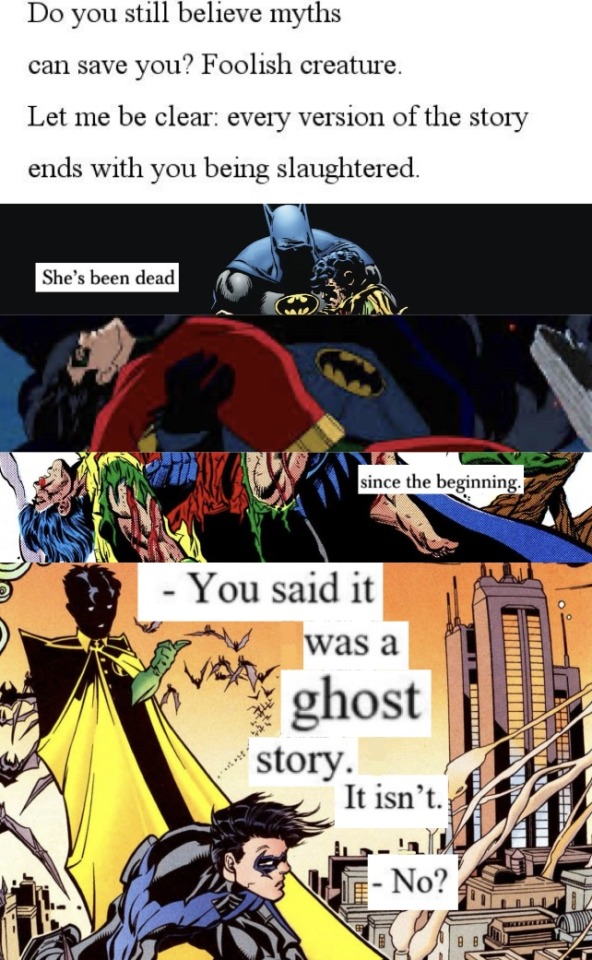
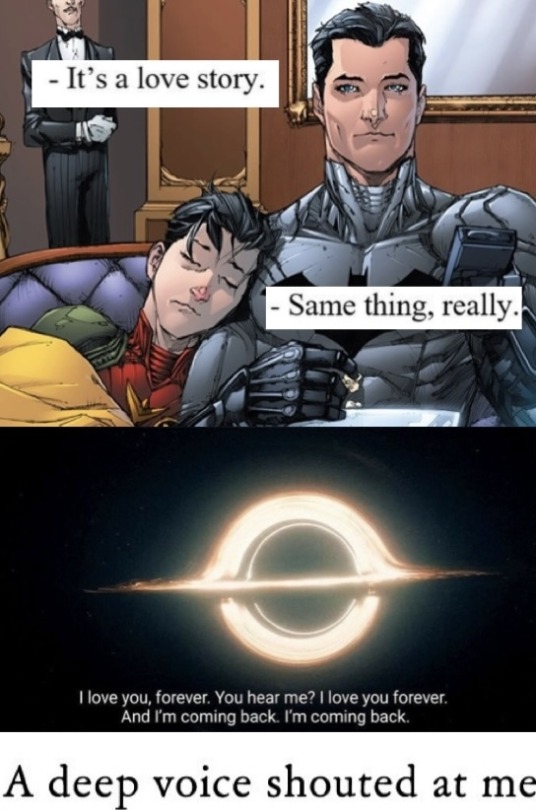

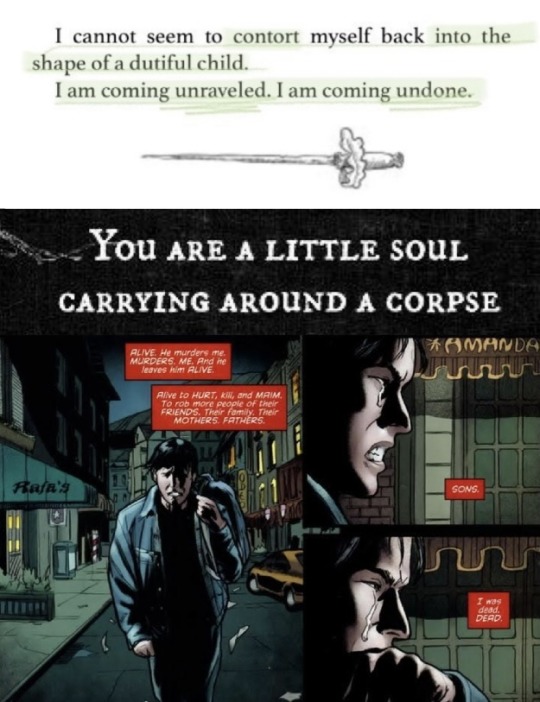
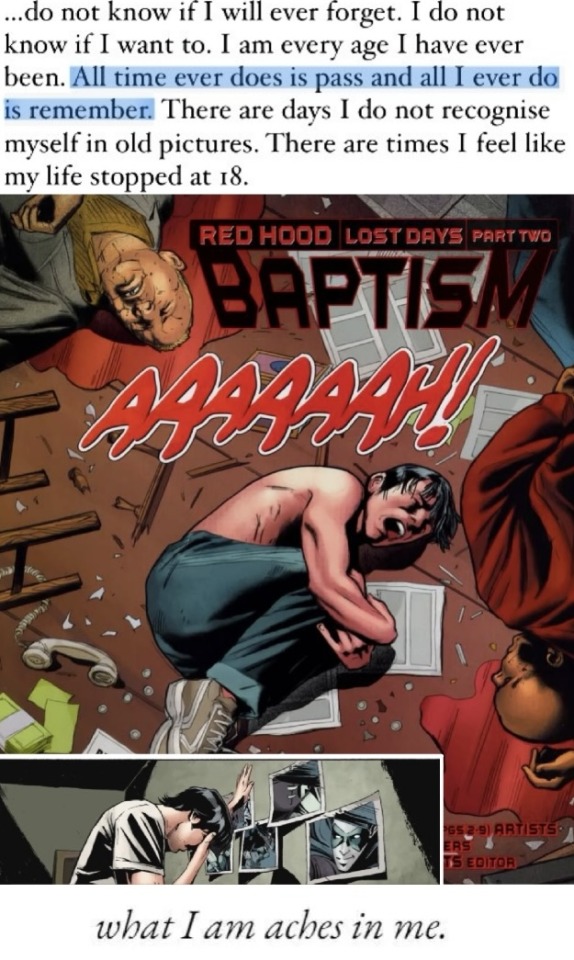



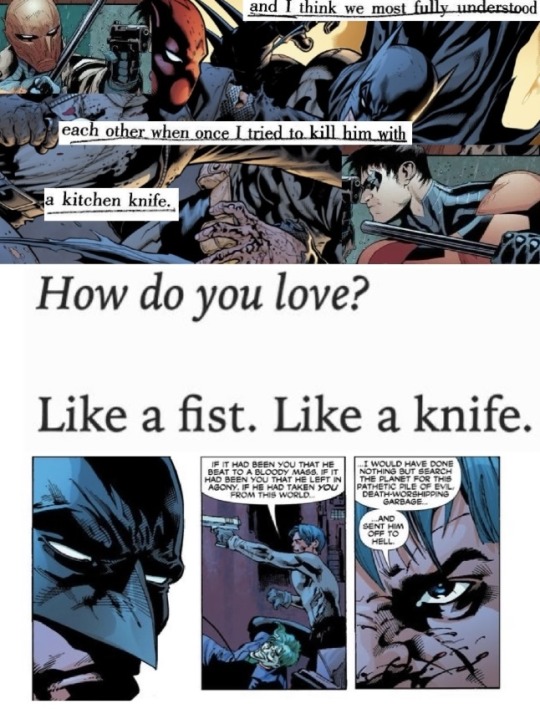
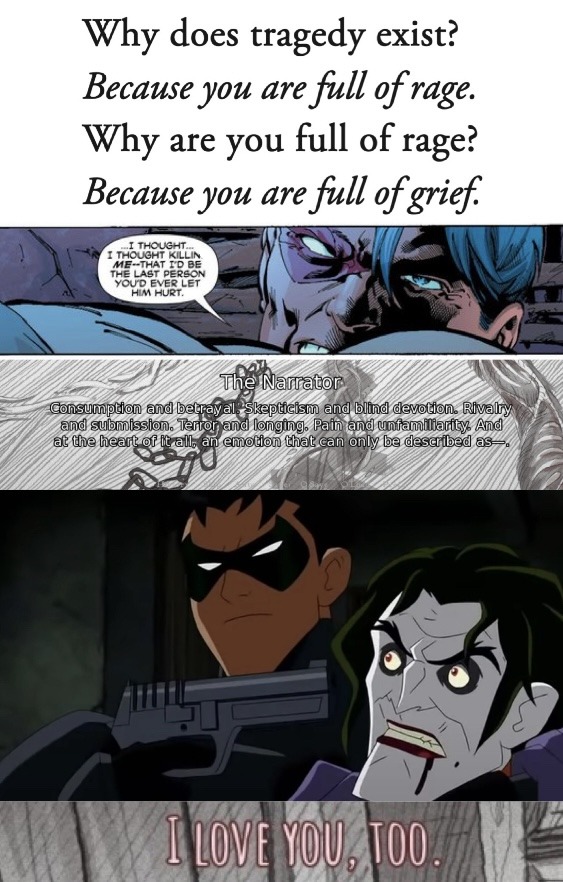
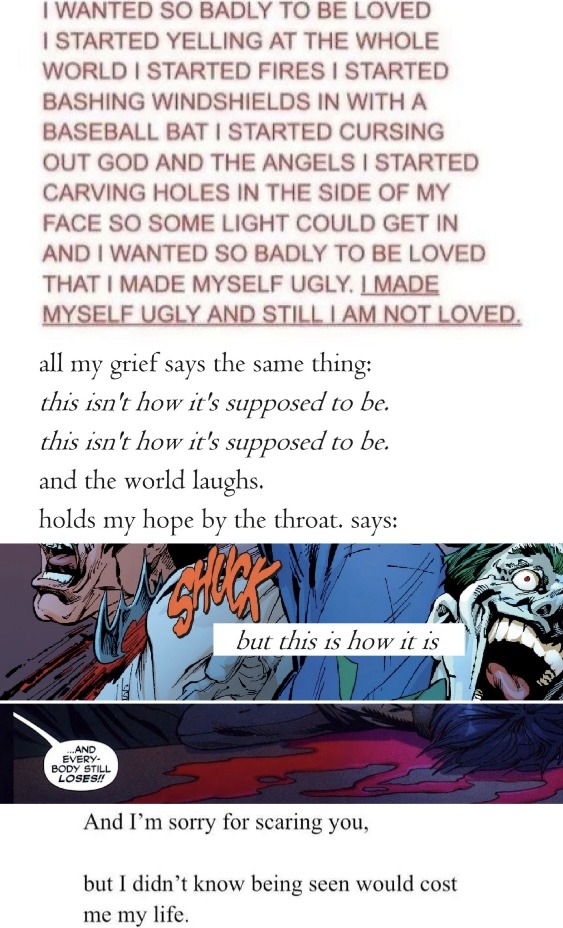



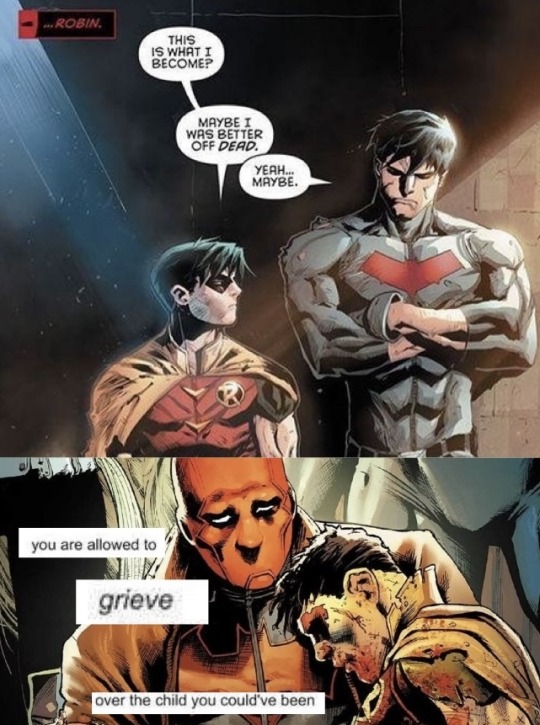


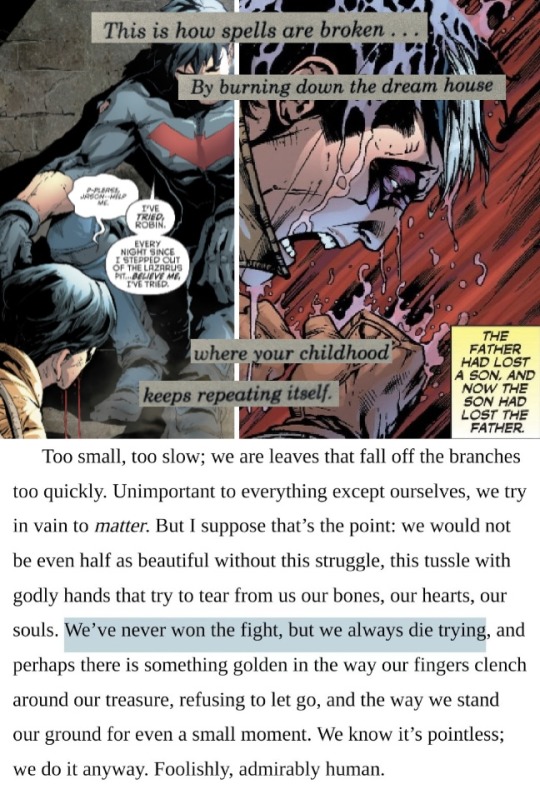
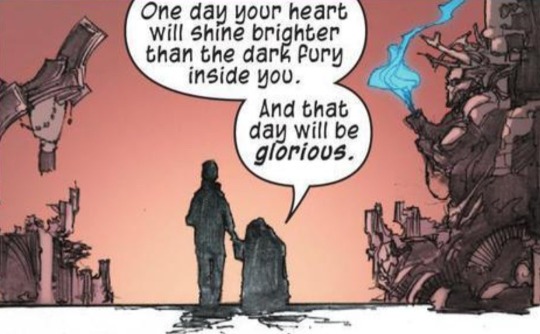

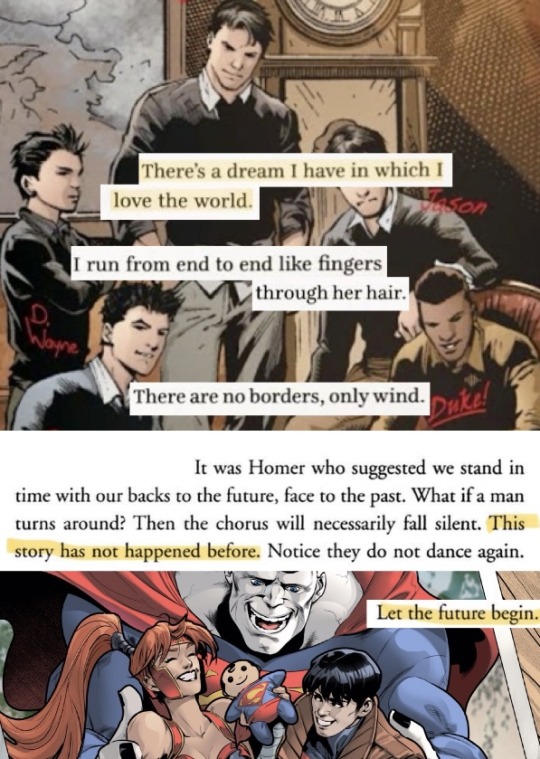
Jason (from the Greek Iásōn, “healer”) Peter Todd (from the German Tod, “death”) - I hope you find your way out of that grave.
dc comics + The Oresteia, Aeschylus / Lady Windermere’s Fan, Oscar Wilde / Grief Lessons: Four Plays [tr. Anne Carson], Euripides + Batman v1 #385 / Batman: The Cult #3 / For Example, Mary Oliver / Batman: Legends of The Dark Knight #100 / Batman: Under the Red Hood / Eight, Sleeping at Last / Red Hood and the Outlaws: Rebirth / Batman: Urban Legends #10 + ? / On Earth We’re Briefly Gorgeous, Ocean Vuong / Red Hood and The Outlaws #25 / Slay the Princess / pinterest + Batman #422 / Batman #424 + Rilke's Book of Hours: Love Poems to God, Rainer Maria Rilke + Batman #428 | A Death in the Family / @/metamorphesque, tumblr / American Teenager, Ethel Cain / Anecdote of the Pig, Tory Adkisson / interpretations of A Death in the Family + The Oresteia, Aeschylus / Nightwing: Secret Files and Origins #1 + the Haunting of Bly Manor + Red Hood and the Outlaws #23 / @/petrichara, tumblr / I Didn't Apologize to the Well, Mahmoud Darwish / Infinite Crisis: Secret Files + pinterest / Ruin and Rising, Leigh Bardugo / Red Hood and the Outlaws #26 / The Cruel Prince, Holly Black / pinterest / Red Hood: The Lost Days / Sue Zhao / Red Hood: The Lost Days part II + Red Hood: The Lost Days #4 / I See Boats Moving, Fernando Pessoa / Oedipus the King, TV Tropes / @/devilsmoon, tumblr / Red Hood: The Lost Days + Speeches for Dr Frankenstein, Margaret Atwood / Saving June, Hannah Arrington + embroidered patch / Slay the Princess / unaligned, @/hamletmaschine + Batman: Under the Red Hood / Batman: Under the Red Hood + Batman and Robin #11 + South and West: From a Notebook, Joan Didion / The Good Fight, Ada Limón / Batman: Under the Red Hood / Grief Lessons: Four Plays, Euripides [tr. Anne Carson] / Batman: Under the Red Hood / Slay the Princess / Under the Red Hood / Slay the Princess / @/sainticide, twitter / The Truth About Grief, Fortesa Latifi + Batman: Under the Red Hood / Batman: Under the Red Hood / Ten Legs, Eight Broken, mandana on tiktok / War of the Foxes, Richard Siken + Under the Red Hood + Batman #428 | A Death in the Family / The Unabridged Journals Of Sylvia Plath, Sylvia Plath / Under the Red Hood + Batman #428 | A Death in the Family / @baitmeat, tumblr + Batman: Under the Red Hood (Deluxe Edition) / Origin Story, Desireé Dallagiacomo / Vive, Vive, Traci Brimhall / The Dogs I Have Kissed, Trista Mateer + Batman: Under the Red Hood + Three Jokers / Red Hood and the Outlaws Rebirth #9 / @/sainticide, twitter + Red Hood and the Outlaws #10 / Would’ve, Could’ve, Should’ve, Taylor Swift / ? + Robin 80th Anniversary 100 Page Super Spectacular / Ep. 4: Joseph Campbell and the Power of Myth -- 'Sacrifice and Bliss', Joseph Campbell / White Knight #7 + Heaven, Mieko Kawakami / Forest Fire, Mitski / Red Hood and the Outlaws Vol. 2 #9 + Batman Annual #25 + Free Will Astrology, Rob Brezsny / Letter XV, @/lucidloving / Red Hood and the Outlaws Vol 1: REDemption / briscoepark + The Civil War, Anne Sexton [compiled by @/lovejoyparadox here] / @/soapstore, tumblr + I Await the Devil’s Coming, Mary MacLane + Claire C. Holland / @/havingrevelations, tumblr / Meditations in an Emergency, Cameron Awkward-Rich + Deathstroke #34 / Grief Lessons: Four Plays by Euripides [tr. Anne Carson] + Red Hood and the Outlaws
#Jason todd#batman#batfam#bruce wayne#web weaving#dick grayson#robin#dc comics#also all love quotes are platonic please do not ship!#also whoever kept putting slay the Princess on my dash I owe you my life
215 notes
·
View notes
Text
List of free audiobooks on YouTube for anyone interested
The Hunger Games by Suzanne Collins
Pride & Prejudice by Jane Austen
The Great Gatsby by F. Scott Fitzgerald
Diary of a Wimpy Kid by Jeff Kinney
The Adventures of Tom Sawyer by Mark Twain
Alice in Wonderland
Animal Farm by George Orwell
The Shadow Over Innsmouth by H P Lovecraft
Frankenstein by Mary Shelley
Crime and Punishment by Fyodor Dostoyevsky
Hatchet by Gary Paulsen
Twelve Years a Slave by Solomon Northup
Of Mice and Men by John Steinbeck
The Village by Caroline Mitchell
The Wonderful Wizard of Oz
Harry Potter and the Philosopher’s Stone (fuck JKR)
Sense & Sensibility by Jane Austen
The Handmaid’s Tale by Margaret Atwood
Twilight by Stephanie Meyer
Upside Down by Danielle Steel
The Fiancée by Kate White
The Silence of the Lambs by Thomas Harris
Percy Jackson & the Olympians: The Lightning Theif
Accidentally Married by Victoria E. Lieske
I’m Glad My Mom Died by Jennette McCurdy
The Collector (book one) by Nora Roberts
The Lies I Told by Mary Burton
Dead Man’s Mirror by Agatha Christie
The Hobbit
The Taken Ones by Jess Lourey
The Good Neighbour by R J Parker
The Island House by Elana Johnson
Desperation by Stephan King
The Healing Summer by Heather B. Moore
The Last Affair by Margot Hunt
To Be Claimed by Willow Winter
Romeo and Juliet by Shakespeare
The Hitchhiker’s Guide to the Galaxy
The Inn by James Patterson
Wonder by R J Palacio
Faking It With The Billionaire by Willow Fox
The Lost Years by Mary Higgins Clark
Forrest Gump by Winston Groom
The Janson Directive by Robert Ludlum
The Catcher in the Rye
The Lottery Winner by Mary Higgins Clark
Where Eagles Dare by Alistair MacLean
Death of a Nurse by M C Beaton
Yours Truly by Abby Jimenez
Treasure Island by Robert Louis Stevenson
The Sonnets by William Shakespeare
Frozen Betrayal by Clive Cussler
The Picture of Dorian Gray by Oscar Wilde
Line of Fire by R J Patterson
Don’t Believe Everything You Think by Joseph Nguyen
The Remnant by Tim LaHaye
The Magic of Reality by Richard Dawkins
The Secret of Chimneys by Agatha Christie
Payment in Kind by J A Jance
The Idiot by Fyodor Dostoyevsky
The Way of the Superior Man by David Deida
The Game of Life and How to Play It by Florence Scovel Shinn
The Richest Man in Babylon by George S. Clason
To Kill a Mockingbird by Harper Lee
A Marriage of Anything but Convenience by Victorine E. Lieske
The Adventures of Huckleberry Finn by Mark Twain
A Christmas Carol by Charles Dickens
The Inheritance Game by Jennifer Lynn Barnes
Ikigai: The Japanese Secret to a Long and Happy Life
Thinking Fast and Slow by Daniel Kahneman
How to Win Friends and Influence People by Dale Carnegie
The Kama Sutra by Mallanaga Vatsyayana
The Wisdom of Father Brown by G K Chesterton
Robinson Crusoe by Daniel Defoe
Robin Hood by J Walker McSpadden
The Poor Traveller by Charles Dickens
Days on the Road: Crossing the Plains in 1865 by Sarah Raymond Herndon
Oliver Twist by Charles Dickens
Atomic Habits by James Clear
I Have No Mouth, and I Must Scream
Trading in the Zone by Mark Douglas
The Art of War by Sun Tzu
The Secret Garden by Frances Hodgson Burnett
A Short History of Nearly Everything by Bill Bryson
The Return of Sherlock Holmes by Arthur Conan Doyle
The Epic of Gilgamesh
Lord of the Flies by William Golding
A Tale of Two Cities by Charles Dickens
Man After Man
Five on a Treasure Island by Enid Blyton
The Red Badge of Courage by Stephen Crane
Charlotte’s Web
Midsummer Mysteries by Agatha Christie
Out of Silent Planet by C S Lewis
The Valley of Fear by Arthur Conan Doyle
Eaters of the Dead by Michael Crichton
The Murder on the Orient Express by Agatha Christie
The Castle of Otranto by Horace Walpole
21 Lessons for the 21st Century by Yuval Noah Harai
Hamlet by Shakespeare
#mental health#positivity#self care#mental illness#self help#recovery#ed recovery#pro recovery#study#study affirmations#studying#studyblr#school#free#audiobooks#YouTube#piracy#bookblr#books#reading#long reads#comfort#meditation#book#study resources#web resources#lizzy grant#poetry#motivation#self love
93 notes
·
View notes
Text
best books I read in 2023:
sophie strand, the flowering wand: rewilding the sacred masculine
alex iantaffi, gender trauma: healing cultural, social, and historical gendered trauma
matthew desmond, evicted: poverty and profit in the american city
betty dodson, sex for one: the joy of selfloving
ching-in chen, andrea smith, jai dulani, the revolution starts at home: confronting intimate partner violence within activist communities
robin stern, the gaslight effect: how to spot and survive the hidden manipulation others use to control your life
nick turse, kill anything that moves: the real american war in vietnam
lori fox, this has always been a war: the radicalization of a working class queer
arline t. geronimus, weathering: the extraordinary stress of ordinary life in an unjust society
roxanne dunbar-ortiz, not a nation of immigrants: settler colonialism, white supremacy, and a history of erasure and exclusion
eyal press, dirty work: essential jobs and the hidden toll of inequality in america
rabbi danya ruttenberg, on repentence and repair: making amends in an unapologetic world
michelle dowd, forager: field notes for surviving a family cult
starhawk, the empowerment manual: a guide for collaborative groups
betty dodson, orgasms for two: the joy of partnersex
timothy snyder, black earth: the holocaust as history and warning
kidada e. williams, I saw death coming: a history of terror and survival in the war against reconstruction
judy grahn, another mother tongue: gay words, gay worlds
jennifer m. silva, coming up short: working-class adulthood in an age of uncertainty
susanna clarke, piranesi
megan asaka, seattle from the margins: exclusion, erasure, and the making of a pacific coast city
starhawk, truth or dare: encounters with power, authority, and mystery
laura jane grace, tranny: confessions of punk rock’s most infamous anarchist sellout
molly smith, revolting prostitutes: the fight for sex worker's rights
richard c. schwartz, you are the one you've been waiting for: applying internal family systems to intimate relationships
timothy snyder, our malady: lessons in liberty from a hospital diary
peter levine, trauma and memory: brain and body in search for the living past
kylie cheung, survivor injustice: state-sanctioned abuse, domestic violence, and the fight for bodily autonomy
timothy snyder, bloodlands: europe between hitler and stalin
joan larkin, a woman like that: lesbian and bisexual writers tell their coming out stories
cj cherryh, hammerfall
264 notes
·
View notes
Text



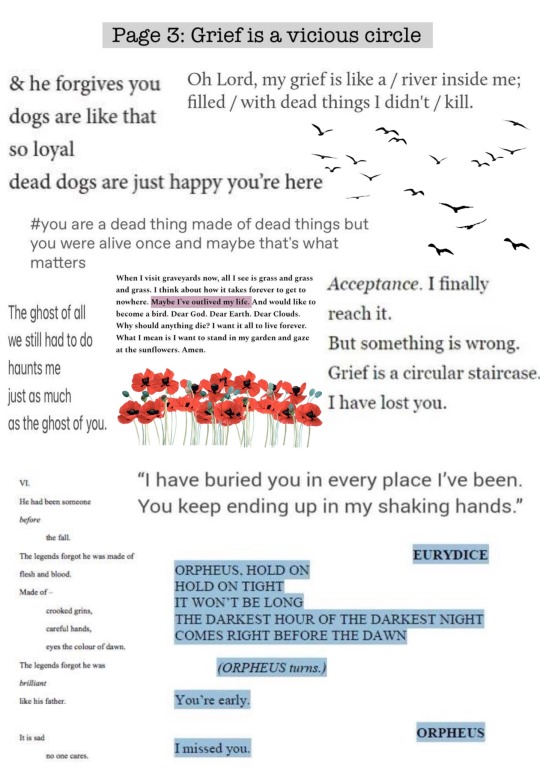
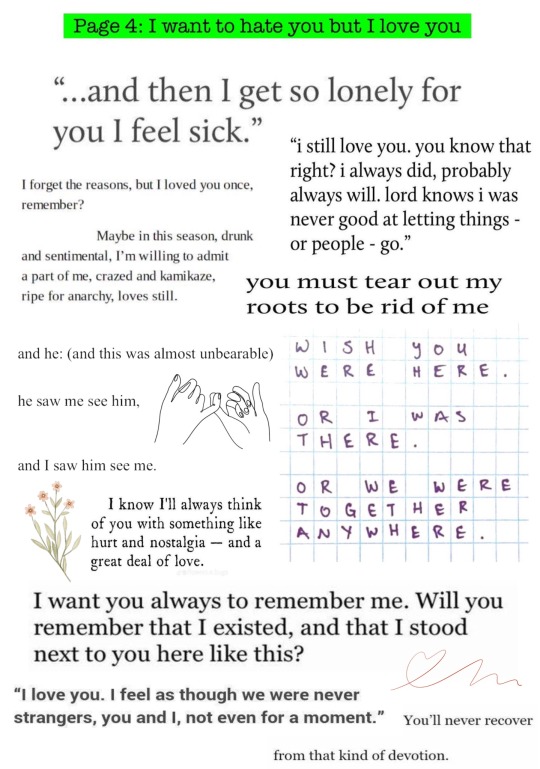
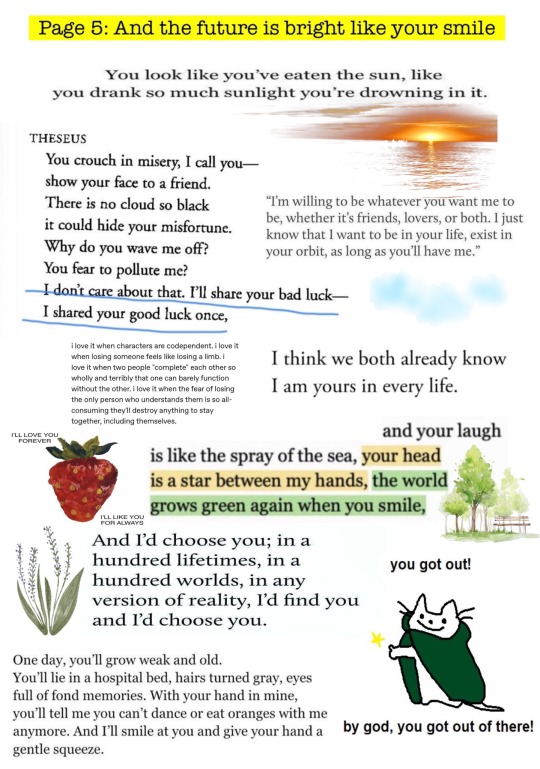

Tommy and Tubbo – Pages: How to melt your essence with someone’s soul
taglist: @pastelvangelion @smallz-o @salineroses @dynamicworms @cindersnows @deadfishisyeq @snyland @missstrawberry @frubbotoxicyuri @haloberry @thecardboardbutterfly @avianchorus @qtubbo @an-egghead @codaattheend @mikaikaika
dm me if you want in or out of taglist
credits:
Prologue
1. “time collapses. love takes your hand and leads you from the world” layla starr
Page 1
2. “Imitations of Drowning” Anne Sexton
3. @.insomniac-arrest
4. https://twitter.com/sainticide/status/1476212797369319424?s=21&t=iGrZnWG5aLGizZ_iGCZR4A
5. “Twenty-One Ways of Leaving” Koleka Putuma
6. https://pin.it/4Iy5VQI
7. @.dvoyd
8. http://hollowworld.co.uk/threads/halvar-vignette-s.55468/post-829118
9. “If There’s A Way Out I’ll Take It” Lora Mathis
10. “Selected Letters of Martha Gellhorn; in a letter to Hortense Flexner and Wyncie King” Martha Gellhorn
Page 2
11. https://pin.it/1QpJ0iz
12. https://pin.it/6WwyKF6
13. “Wayward son” Tyrannus Basilton Grimm-Pitch
14. https://pin.it/5Mgyjhs
15. @.galactic-mystics-writes
16. @.dazzlingtiredeyes
17. “The Next Time We Talk on Facebook” Clementine von Radics
18. N/A
19. Fall Out Boys – Young Volcanoes
Page 3
20. https://pin.it/3Nxa6eV
21. “Jesus Texts” Pádraig Ó Tuama
22. @.codaattheend
23. https://pin.it/3YFQf7P
24. by Edward Lee
25. “The Five Stages of Grief” Linda Pastan
26. “A song for a lover of a long time ago” Bon Iver
27. “Icarus || Percy Jackson” SarcasticSunshine
28. https://pin.it/59O2ivf
Page 4
29. “Selected Letters of Martha Gellhorn” Martha Gellhorn
30. @.aretherestarsinhell
31. “One Last Poem for Richard“ Sandra Cisneros
32. “Poem of the End” Marina Tsvetaeva
33. https://pin.it/7mGA0UT
34. https://pin.it/1TKqm7d
35. “Norwegian Woods” Haruki Murakami
36. by Friedrich Nietzsche
37. “For Your Own Good” Leah Horlick
Page 5
38. “When Rome Falls” Yves Olade
39. https://pin.it/5CnTcJ9
40. “Whatever You Need” Marley C.
41. @.eridan-ampora
42. “Pillow Thoughts by Courtney Peppernell” Cierra
43. https://pin.it/e9k4bKp
44. “Sunstone” Octavio Paz tr. by Elliot Weinberger
45. by Kiersten White
46. https://pin.it/1i7tkZg
47. https://pin.it/4S39jLe
Epilogue
48. @.jovialtorchlight
All the other little pictures are free stickers from PicsArt
#liss writes posts#liss does web weaving#clingy duo#c!clingyduo#c!tommy#c!tubbo#dream smp#dsmp#tommyinnit#tubbo
220 notes
·
View notes